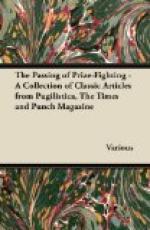And so you’ll see in summer-time,
when all the dew is wet,
The footprints of his golden claws maybe
will linger yet;
The little golden flower-buds will gleam
like golden grain,
And if you pick and cherish them perhaps
you’ll dream again.
* * * * *
[Illustration: “HAVE YOU EVER BEEN UP IN AN AEROPLANE, GRANDPA?”
“NO, MY BOY—NOT YET.”]
* * * * *
HONOURS EASY.
I.
Not very long ago the following advertisements appeared in the same column of The Southshire Daily Gazette:
“Lost, a pure black
Pekinese dog, wearing a silver badge marked
‘Cherub.’
Handsome reward offered. F.B., Grand Hotel,
Brightbourne.”
“Found, a black Pekinese,
wearing a silver badge marked
‘Cherub.’
No reward required. The Limes, Cheviot Road,
Brightbourne.”
II.
On the same morning the paper was opened and scanned almost simultaneously by Mrs. Frederick Bathurst in the sitting-room which she and her husband occupied at the Grand Hotel, and by Mr. Hartley Friend in the morning-room at “The Limes.”
“Oh, Fred,” exclaimed Mrs. Bathurst, “Cherub has been found. He’s all safe at a house called ‘The Limes,’ in Cheviot Road. Isn’t that splendid?”
“Very good news,” said her husband. “I told you not to worry.”
“It’s a direct answer to prayer,” said Mrs. Bathurst. “But—”
“But what?” her husband inquired.
“But I do wish you had taken my advice not to offer any reward. You might so easily have left it open. People aren’t so mercenary as all that. It stands to reason that anyone staying at an hotel like this and bringing a dog with them—always an expensive thing to do—and valuing it enough to advertise its loss, would behave properly when the time came.”
“I don’t know,” Mr. Bathurst replied. “Does anything stand to reason? The ordinary dog-thief, holding up an animal to ransom, might be deterred from returning it if no mention of money was made. You remember we decided on that.”
“Oh, no, I don’t think so. You merely had your way again, that was all. I was always against offering a reward. And the word ‘handsome’ too. In any case I never agreed to that. You put that in later. Another thing,” Mrs. Bathurst continued, “I knew it in some curious way—in my bones, as they say—that the fineness of Cherub’s nature, its innocence, its radiant friendliness, would overcome any sordidness in the person who found him, poor darling, all lost and unhappy. No one who has been much with that simple sweet character could fail to be the better for it.”
Mr. Bathurst coughed.
“That is so?” his wife persisted.
“Well,” said Mr. Bathurst, after helping himself to another egg, “let us hope so, at any rate.”




